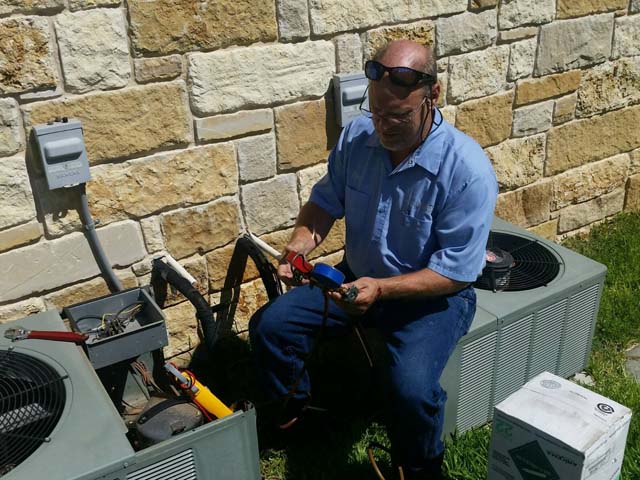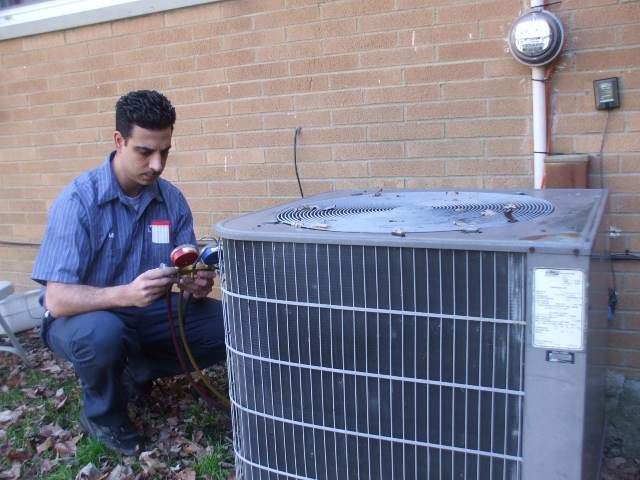When it comes to maintaining your air conditioner (AC), there’s more to it than just cleaning filters and replacing parts. One of the most crucial aspects of ensuring your system runs efficiently is to regularly check your air conditioner’s refrigerant levels. The refrigerant plays a central role in how your AC functions, and if it’s not at the proper level, your system can suffer from decreased performance, increased energy consumption, and even damage over time. This blog post will explore why checking and maintaining your air conditioner’s refrigerant levels is essential for its longevity and efficiency.
What is Refrigerant and Why Does It Matter?
Refrigerant is a fluid or gas used in air conditioners to absorb heat from the indoor air and release it outside. This process occurs in the evaporator and condenser coils. The refrigerant cycle starts when the AC absorbs heat from inside the home, and then it expels that heat outside. Essentially, it’s the substance responsible for cooling your home. Without the proper level of refrigerant, the AC can’t operate efficiently, leading to problems ranging from weak cooling to complete system failure. For optimal performance, regular Pasir Ris aircon servicing is essential to ensure your system remains well-maintained and the refrigerant levels stay balanced.
Signs Your Refrigerant Levels May Be Low
There are several signs that your air conditioner may have low refrigerant levels. Recognizing these signs early on can help you address the issue before it becomes a major problem. Some common indicators include:
- Warm Air Blowing from Vents: If your air conditioner is blowing warm air, it may be a sign that the refrigerant levels are low. Without sufficient refrigerant, the cooling cycle cannot effectively absorb and release heat.
- Ice Buildup on the Coils: Low refrigerant levels can lead to the formation of ice on the evaporator coils. As the refrigerant’s ability to absorb heat diminishes, moisture can freeze on the coils, causing the system to freeze up and malfunction.
- Hissing or Bubbling Noises: A hissing or bubbling sound coming from your AC unit can indicate a refrigerant leak. This noise is the result of refrigerant escaping from the system, which not only reduces its cooling capacity but can also lead to further damage if not fixed.
- Higher Energy Bills: If your air conditioner is working harder to cool your home due to low refrigerant levels, it will consume more energy. You may notice an increase in your energy bills as the system struggles to maintain the desired temperature.
- Longer Cooling Time: When the refrigerant is low, your AC will take longer to cool your home. If you find that your home isn’t cooling down as quickly as it once did, the refrigerant might be the issue.
How Low Refrigerant Levels Affect Your Air Conditioner’s Performance
Air conditioners are designed to operate with a specific amount of refrigerant. When this level is too low, it can cause a host of problems. Let’s take a closer look at how low refrigerant affects your AC:
- Decreased Cooling Efficiency: Without enough refrigerant, your AC will struggle to absorb heat and cool the air properly. This means your home will not reach the desired temperature, and you may feel uncomfortable despite running the AC for long periods.
- Increased Wear and Tear: A low refrigerant level forces your air conditioner’s compressor to work harder to pump refrigerant through the system. This extra strain can cause the compressor to fail, which is a costly repair. Regularly checking and maintaining the refrigerant level can prevent such damage.
- Frozen Coils: As mentioned, low refrigerant can cause ice to form on the evaporator coils. The ice builds up because the refrigerant cannot absorb heat properly, causing moisture to freeze. Frozen coils hinder airflow, reduce efficiency, and can even cause the AC to shut down completely.
- Reduced Lifespan of the AC: If low refrigerant levels are not addressed, the constant strain on the compressor and other components can significantly reduce the lifespan of your air conditioner. Regular maintenance, including checking refrigerant levels, can help your AC run smoothly for many years.
- Increased Repair Costs: When an air conditioner operates with low refrigerant, it’s working inefficiently, leading to more wear and tear. Over time, this can result in expensive repairs, such as replacing the compressor, which is one of the most expensive parts of the system. Regular checks can help you avoid this costly scenario.

Why Checking Refrigerant Levels Should Be Part of Routine AC Maintenance
Checking refrigerant levels is often overlooked in routine maintenance but should be a priority. Here are some reasons why you should regularly check your air conditioner’s refrigerant levels:
- Prevention is Key: Just like you wouldn’t wait until your car runs out of oil before changing it, you shouldn’t wait until your AC breaks down to check the refrigerant. Catching low refrigerant levels early can prevent extensive damage and keep your system running efficiently.
- Improved Efficiency: When your AC is operating with the correct amount of refrigerant, it can cool your home more effectively. This results in lower energy consumption and better cooling performance, helping you stay comfortable without breaking the bank on energy bills.
- Extended Lifespan of Your AC: As mentioned earlier, maintaining optimal refrigerant levels reduces strain on the compressor and other components. This can extend the life of your air conditioner, ensuring that it continues to function well for years to come.
- Reduced Environmental Impact: If your AC has a refrigerant leak, the refrigerant can escape into the atmosphere, contributing to ozone depletion. Regularly checking refrigerant levels can help you identify leaks early, preventing harm to the environment.
How to Check and Maintain Refrigerant Levels
Checking refrigerant levels is not something most homeowners can do on their own, as it requires specialized tools and expertise. However, there are some steps you can take to ensure your system is well-maintained:
- Hire a Professional: It’s best to call a licensed HVAC technician to check the refrigerant levels. They can properly measure the refrigerant and inspect for leaks. Regular professional maintenance is key to keeping your air conditioner running smoothly.
- Look for Leaks: If you suspect a refrigerant leak, don’t attempt to repair it yourself. Instead, contact a professional who can locate and fix the leak safely. Fixing a leak is essential before refilling the refrigerant.
- Schedule Routine Maintenance: Make sure to schedule regular maintenance for your air conditioner, ideally before the start of each cooling season. This will help ensure that all components, including refrigerant levels, are in good condition.
Conclusion
Your air conditioner’s refrigerant plays an integral role in its performance, and regularly checking its levels is essential for keeping the system efficient and effective. Low refrigerant levels can lead to a host of problems, including reduced cooling capacity, increased energy consumption, and damage to the system’s components. By taking proactive steps to maintain proper refrigerant levels and scheduling routine maintenance, you can extend the life of your air conditioner, reduce the need for expensive repairs, and keep your home comfortable year-round. Don’t wait until your system is struggling—check those refrigerant levels regularly and keep your AC running smoothly for years to come.

